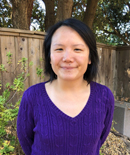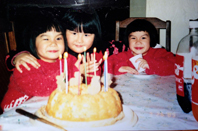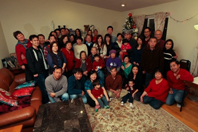Interview with Jennifer Lee
A Conversation with Jennifer Lee, Fellowship Coordinator
Are you a native Californian? Tell me about your family history.
 I am a native Californian and was born at St. Mary’s Hospital in San Francisco. My mother came with her family from Hong Kong as a teenager. At the age of eight, my father emigrated from Guangzhou, China, to Trinidad where my grandfather was established and, due to Chinese restrictions about how many people could at any given time leave China, it took awhile before my mother and aunt could come as well; permissions had to be obtained from the village head. I believe that this was the practice because, in theory, men would send money home and continue to support the local economy but women were left as the primary workers in this agricultural region. In Trinidad, the locals worked the farms and fished and the Chinese population ran grocery stores and café shops. When my dad became a teenager, grandfather sent him to live with my aunt in Mountain View. My parents met through a mutual friend and matchmaker, moved to San Francisco and had me and then, two years later, my identical twin sisters. Everyone in my family has had some connection to banking except one of the twins, who became a biochemist.
I am a native Californian and was born at St. Mary’s Hospital in San Francisco. My mother came with her family from Hong Kong as a teenager. At the age of eight, my father emigrated from Guangzhou, China, to Trinidad where my grandfather was established and, due to Chinese restrictions about how many people could at any given time leave China, it took awhile before my mother and aunt could come as well; permissions had to be obtained from the village head. I believe that this was the practice because, in theory, men would send money home and continue to support the local economy but women were left as the primary workers in this agricultural region. In Trinidad, the locals worked the farms and fished and the Chinese population ran grocery stores and café shops. When my dad became a teenager, grandfather sent him to live with my aunt in Mountain View. My parents met through a mutual friend and matchmaker, moved to San Francisco and had me and then, two years later, my identical twin sisters. Everyone in my family has had some connection to banking except one of the twins, who became a biochemist.


What was the most drastic change of 2018? What do you hope for 2019?
The most drastic change was coming to UCSF from banking, an industry in which I’d worked since college. It was a given, a known environment, but I wasn’t necessarily challenged—it is basically a money making field. A layoff forced me to reevaluate what I wanted in the next chapter of my life and, although it would have been easy to return, I wanted more humanitarian, more useful, work. Working within the DHM, even though I am a layperson, I feel that I am part of something larger, where people are trying to help other people. Here, I feel that I am always learning and there are so many opportunities for humility, for being challenged, for growth. I am still new but I hope that in 2019 there will be more opportunities for me to contribute and make things easier for everyone around me, to be a better team player. There is always so much more that we, that I, can do.
How is UCSF and/or DHM different than your previous work environment?
In banking, bankers and tellers have regimented responsibilities but here, doctors have so many other things that they have to do, they wear lots of hats: they are teachers, doctors, mentors, researchers, and have meetings, so deadlines are somewhat more flexible.
Are you a shy person? Who or what brings you out?
I am basically an introvert with shades of extrovert. As a teller, you have to be personable with people and any speaking ability I have stems from interacting with customers as part of good customer service. Outside of that, if I am talking with someone who I feel is really listening, then it is easy to open up. What brings me out is a good conversation and a comfortable environment.
Who has impressed you with his or her accomplishments? Was it that person’s results or their effort that intrigued you?
 There is a family member who struggled with mental illness and, for a very long time, managed to keep it quiet because she didn’t want any special treatment; she didn’t want people to regard her differently. Her OCD and schizophrenia began in her late 20s, maybe early 30s when she was diagnosed and was on medication until a stressful period pushed her into a breakdown. Since that happened, she’s been more open to acknowledging her condition. I consider her inspirational and admire her effort to live normally, go about living her life and taking care of her family without complaint.
There is a family member who struggled with mental illness and, for a very long time, managed to keep it quiet because she didn’t want any special treatment; she didn’t want people to regard her differently. Her OCD and schizophrenia began in her late 20s, maybe early 30s when she was diagnosed and was on medication until a stressful period pushed her into a breakdown. Since that happened, she’s been more open to acknowledging her condition. I consider her inspirational and admire her effort to live normally, go about living her life and taking care of her family without complaint.
Is there a word that you absolutely love, hate or overuse?
I think it could be, “s---.” Another phrase that often escapes me, because it’s hard for me to say “yes” or “no,” is, “a little bit.” I hedge because it’s hard for me to be definite so I often quantify.
When did you last feel compelled to apologize?
All the time! It’s my biggest quirk and I think that quite often I use it in emails and in conversation. I am not necessarily apologetic but it seems more polite to say so when asking people to do things and part of that, I think, stems from banking, when asking people to do what they may not expect to do. Part of it also may be that I am one of those people who, if I cannot do something perfectly, I am reluctant to do it and that sometimes gets me into trouble—so I end up apologizing.
When it comes to weekends, are you a planner or do you prefer being spontaneous?
Ideally, I would want someone to plan it for me. If I don’t have to plan anything, I prefer not to but, if I must, I plan it completely down to the last detail. For weekends, it’s mostly about what I want cook or eat and then I prefer whomever I am cooking for or eating with to share their ideas. I don’t plan menus; my favorite recipes are anything I can cook in one pot but, if you ask me to plan out a dinner to dessert and drinks, that’s not happening.
What needless activity takes up too much of your time? What could you do to minimize it?
Is worrying an activity? Worrying takes up a lot of my life and I try to counter it by maybe praying a little bit more. There are times that I want to worry but then remind myself that doing so won’t add any time to my life and that my anxiety level would just climb. I close my eyes, think about positive things, like the beach and the sound of waves, and reassure myself that I’ve done as much as I could. If it’s something that I can’t fix at 3:00 a.m., I just wait it out. I have to go through the process of convincing myself that worrying is futile. On Sundays, it helps to plant myself on the couch and watch football.
How do you lose—and find—yourself? What little thing makes you happy or calm?
Even though I am an introvert, having a good conversation with the right person, or people, in a comfortable situation. Conversing for hours at a time, from serious topics to mundane, makes time go faster and I forget about everything else.
Describe your least favorite housekeeping chore.
Tidying up. I admit to being a little bit of a packrat and over the ten years that I worked in banking, I kept boxes of manuals just in case I might want to read them again. And key chains, because someone took the time on their vacation to purchase it, bring it back and gift it, so I can’t throw it (over thirty of them) away. I only have two keys: one to my car and the other to my house. I just can’t seem to be able to throw things out.
What do you owe to yourself?
I have a fear of failure, a feeling that I am not doing enough. One thing I’ve been trying to take to heart and learn is that, instead of worrying about next steps or the unknown, I have gotten through much in my life. In those moments when I didn’t think that I could get through or felt that I had failed—and sometimes had failed—I got through them, learned from them and moved on. What I owe to myself is the awareness that no matter the situation, there’s a reason why something is happening and I owe myself the credit for knowing that I can probably handle it instead of selling myself short. I can probably do more than I realize.
Thank you, Jennifer.
- by Oralia Schatzman
View Jen's professional bio | Go back to interviews
